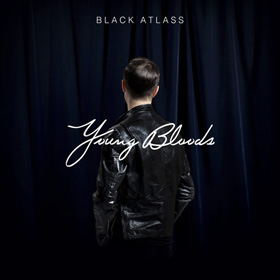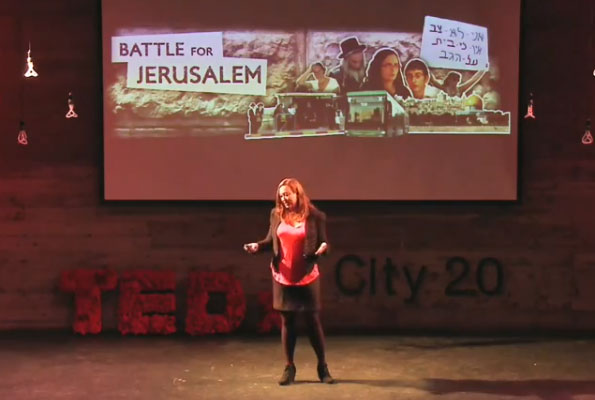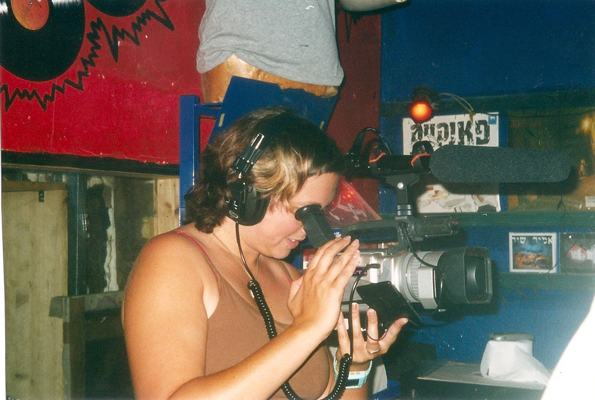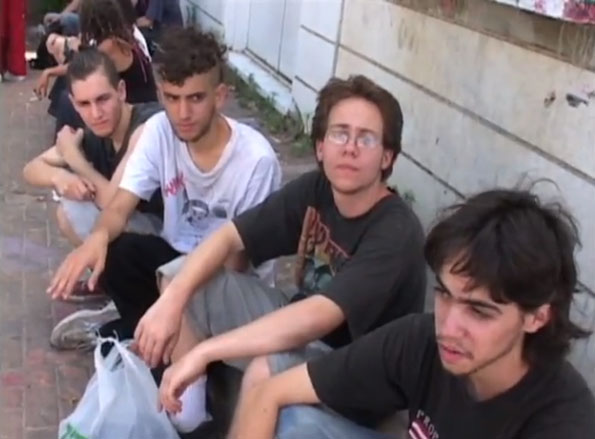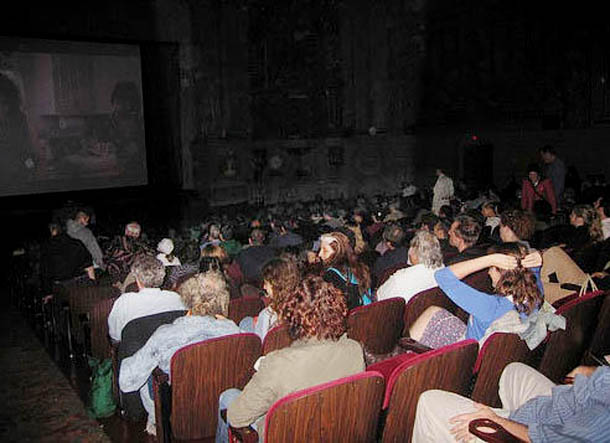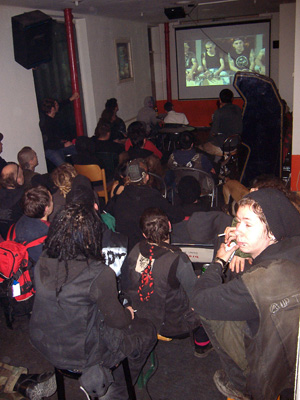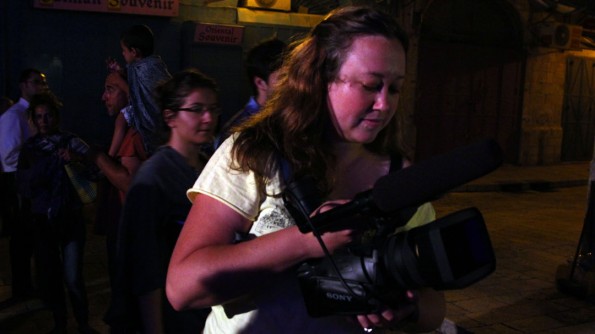Liz Nord: Director & Multi-Platform Producer (Pt. 1)
Flavorpill has referred to Liz Nord as a “fierce, youthful visionary.” Her past films include Jericho’s Echo: Punk Rock in the Holy Land and a Haiti-based documentary for Wyclef Jean’s NGO. Liz also ran MTV’s Emmy Award-winning 2008 presidential election coverage and has produced work for a wide range of other clients.
Liz is currently producing the transmedia project Jerusalem Unfiltered with web, mobile, live, and traditional film components.
[PART ONE: Liz’s path to becoming a filmmaker-producer and her experience of making & promoting her first film, the critically-acclaimed documentary Jericho’s Echo: Punk Rock in the Holy Land]
Tell us a bit about your background and early influences.
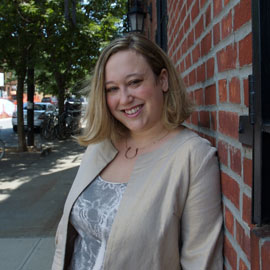 As far as formative experiences, I was really lucky because although I grew up in a sheltered little town in upstate New York, I have these two older brothers who were already out & about in the world as artists—one is an experimental jazz musician, the other was a fashion designer, who is now a video installation artist.
As far as formative experiences, I was really lucky because although I grew up in a sheltered little town in upstate New York, I have these two older brothers who were already out & about in the world as artists—one is an experimental jazz musician, the other was a fashion designer, who is now a video installation artist.
They showed me that there was this whole other life that was possible, outside of what I was exposed to at home. They would send me postcards, “Here I am playing music on the streets in Switzerland to make a living.”
I always knew that it was a creative life or bust. There was never “Maybe I’ll go to business school…”
What are your thoughts on leading a “creative life?”
What it comes down to is being open to following a non-traditional path; one that is rewarding but not always financially stable.
Also, it’s the willingness to pursue a new opportunity that falls outside of one’s experience, followed by the tenacity to figure it out and excel at it.
I’ve always been inspired by people and their stories. I initially thought that I would go to college to make movies, but veered into graphic design and multimedia. The internet was emerging and it was exciting—a place where someone who was interested in a lot of the different aspects of creative life—stories, movies, pictures, graphics, words, etc.—could put them all into play.
I freelanced as a graphic designer throughout college and afterwards I worked for all sorts of companies. I got an informal business education just from working at so many startups that rose & fell really quickly.
“You have to be resourceful about opportunities to pursue a creative life.”
A lot of those agencies that you worked for early on seemed to lean toward education and engaging youth in a certain way, which seems aligned with what you’re doing now.
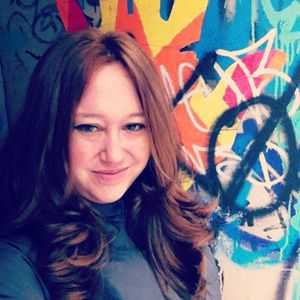 I think that if there’s one thread in my work it’s that I try to work on projects that are positive for the world, or at least not harmful, which I think that a lot of media can be. So the education realm was a natural fit…
I think that if there’s one thread in my work it’s that I try to work on projects that are positive for the world, or at least not harmful, which I think that a lot of media can be. So the education realm was a natural fit…
While I was working as a graphic designer in San Francisco, I started teaching. I joined Studio 5, which was this volunteer program intended to show kids that there are careers in the arts. I loved it so much, you learn a lot by teaching people…
At the same time I started taking film classes.
In addition to being open to trying things that might be a little outside of your comfort zone, you have to be resourceful about opportunities to pursue a creative life.
I was working at an internet company and a lot of layoffs were happening around us. I asked my employer if I could take—for “professional development’s sake”—a digital video class. They paid for it, I signed up for the class and then…I got laid off (laughs)! So suddenly I had a “state-supported Arts grant”—a.k.a unemployment and a video class—and I started making movies.
At the time, if you were trying to change careers, you could apply in the state of California to take free classes, and so even though I was broke I ended up being able to take an entire video production certification at the Bay Area Video Coalition.
I also worked on any project that would come my way, just to get on set and learn . . . for one spec commercial, I had to prepare tray after tray of “bagel bites”…hundreds!
“Part of the process, with any documentary, is that you kind of have to go with whatever happens.”
What is the process by which your first film– 2005’s Jericho’s Echo–came about?
Ha, I feel like if anyone had told me how much work it would be I might not have gone there.
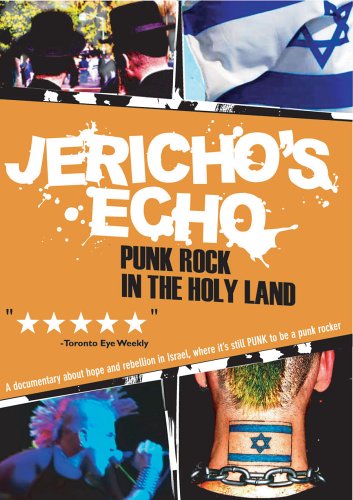 I decided that instead of going to grad school, I was just going to make a movie. Fortunately I was smart enough to make a movie about punks, so it could seem like the very raw aesthetic it had was on purpose (laughs). I did not know what I was doing, I had used my camera about five times before I went…but I was determined!
I decided that instead of going to grad school, I was just going to make a movie. Fortunately I was smart enough to make a movie about punks, so it could seem like the very raw aesthetic it had was on purpose (laughs). I did not know what I was doing, I had used my camera about five times before I went…but I was determined!
People were very discouraging. One of the classes I had taken was about raising money to make a film. Now, it IS wicked expensive, and the teacher’s particular perspective was that you needed to have wealthy individuals finance your project.
I said, “Well that’s great for a well-connected person, but I don’t know anybody that wealthy to ask, so what do I do?” His answer was, “Well, GET to know them.” I was in my early 20’s, going “Uhhh..” I was totally baffled.
There were all these pointers, like “either you become some sort of Hollywood producer, or you just go totally D.I.Y.” So I went totally D.I.Y.
I learned a big lesson, and this is true for any documentary filmmaker: your project is not going to be what you thought it was….and that usually goes for better than for worse.
 In this case I went to Israel thinking that I was going to make a documentary about this one band, Useless ID. They had come from Israel and toured in the States a few years prior. I helped put on a show for them in Boston, they stayed with me, and I thought “an Israeli punk band, who knew?” I thought their story was really interesting as this band that got out of a tiny scene in a tiny, misunderstood country and was touring around.
In this case I went to Israel thinking that I was going to make a documentary about this one band, Useless ID. They had come from Israel and toured in the States a few years prior. I helped put on a show for them in Boston, they stayed with me, and I thought “an Israeli punk band, who knew?” I thought their story was really interesting as this band that got out of a tiny scene in a tiny, misunderstood country and was touring around.
I had done about a year of research before I went and I knew a lot of the other players in the scene, but I thought that they would just sort of be the ancillary characters. However, when I got there it turned out that the Useless I.D. guys weren’t that open to me filming their lives. One guy had a girlfriend who didn’t want to be on camera, so he would never be on camera, another guy was getting married and he didn’t want the wedding filmed…
So here I was, already over there, thinking I’m making this movie, and then it’s “Oh my God, they’re suddenly not really letting me in, what am I going to do?”
Part of the process, with any documentary, is that you kind of have to go with whatever happens. So in this case I just interviewed everyone from the whole scene who would talk to me, and I think it ended up being a much more interesting project. Because although Useless ID’s story is interesting, they’re now in the movie as this older, more experienced voice, and I think the more compelling stories end up coming from the really young guys who are just figuring it all out.
Part of the challenge early on also was gaining legitimacy with these guys. They were like, “Who is this American chick with a camera, not with a news station and not with anybody…?” I’m thinking I’m so “punk” for going to Israel by myself with a camera to make this movie, but those guys didn’t understand what I was trying to do.
How did you gain their trust?
I just kept showing up, which I think might be another theme throughout all of my work and for any sort of creative person. It’s like a balancing act; on one hand you go with the path, you go with the flow, you see what happens, on the other hand you’re persistent as shit! If you really want to make something work you can’t really be a slacker.
Another nice thing about the whole punk ‘zine aesthetic of the film was that it didn’t matter if all the footage came from the same place. I had a friend shoot some footage for me after I had left, I also put out a call for other stuff I couldn’t shoot myself, like military operations…I had video activists sending me stuff.
Before there was a Kickstarter or Indiegogo, I did an online fundraising campaign, it really spread around. The punk community is this kind of niche so people are in touch with each other and things get around, so I was getting $5-10 donations from Japan, so cool…I don’t remember how much I raised that way but it was significant, it was like 10 grand or something which at the time felt like a million dollars.
“I just kept showing up . . . if you really want to make something work you can’t really be a slacker.”
After Jericho’s Echo came out, you spent a year going on this international tour in support of it. How did that happen?
Part of the benefit of having done this grassroots fundraising was that it actually built community around the film. By the time Jericho’s Echo came out there were all these people who were literally and emotionally invested in it, who wanted it to come to their town.I hit the pavement. I was very persistent. I would use one gig as an anchor and then I would try to set up other dates around the area. It was a lot of work; I did my own press kits, I silkscreened the covers, I would figure out who the movie writer at the local daily was and I would reach out to them personally.
So it wasn’t like you had an agent or anything, you were aggressively promoting yourself…
No agent, it was totally D.I.Y., although that phrase isn’t exactly right as there were tons of people that helped me along the way. Someone once said that independent filmmakers aren’t independent, they’re interdependent; it takes a damn village!
The foreign dates were all set up by other people, for example this German guy who had done some of his military service in Israel and gotten involved in the Punk scene there, wrote a ‘zine about it, emailed me and was like “We should tour Germany!”
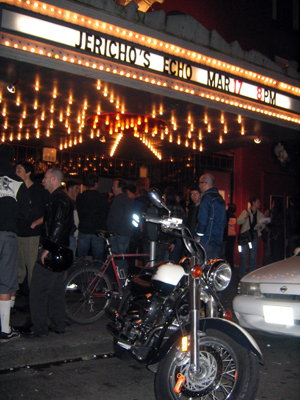 The guy had a booking agent the week after I said yes, and it was a full-on, 17-city tour. My tours here in the U.S. were more like a band. I was very involved in the independent music scene growing up, and that experience became very useful in touring with the movie, because I knew how to sleep on people’s couches and make it happen.
The guy had a booking agent the week after I said yes, and it was a full-on, 17-city tour. My tours here in the U.S. were more like a band. I was very involved in the independent music scene growing up, and that experience became very useful in touring with the movie, because I knew how to sleep on people’s couches and make it happen.
The German tour was different; my expenses were all covered, we got paid, housed and fed at every date. In Europe I think there’s more patronage for the Arts, even in the total grassroots world, so we were treated really well, it was awesome.
After making the movie and touring for it, I thought I would never make anything else related to the Middle East.
Why is that?
Any project will take a lot out of you emotionally, and that’s compounded when you’re tackling a topic that people feel so passionately about. In this case, by putting myself out there with something about Israel, suddenly it’s as if I’m asking to be that sounding board for people to project all of those emotions onto.
Don’t get me wrong, the Q&A sessions were among the most satisfying things about doing the film, and part of the reason I made the movie in the first place is because I wanted dialogue to ensue. But even when it’s positive, it’s still emotional.
For example, some of the “cities” on the German tour were really small towns and I encountered people who had never met a Jew before!
One guy came up to me, he had wanted to meet me and say that he was sorry because his grandmother was like a big-time Nazi.It was a real eye-opener. I’m Jewish, and I remember the time when I was a little kid that I realized, “Oh if I had lived in Germany during that time, it could have been me…”
Looking at it from the view of a victim, and then flipping the script to sympathize with a German kid who one day, probably around the same age realized “Oh my God, my grandmother—who I love—was a frikkin’ Nazi.” This guy had felt burdened with this his whole life and when he met a Jewish girl he felt compelled to tell her about it.
He felt like he had to make amends to you.
Even though I consider that a positive experience, it was still super intense, you know?
One cool thing about being a documentary filmmaker is that I can immerse myself in topics that I want to know about and then I can move on to something else. Israel is different for me, though. It just keeps pulling me back. Here I am, 8 years later, with two more Israel-related projects in the works…the country’s just too darn interesting!
Keep up with Liz at Liznord.com





